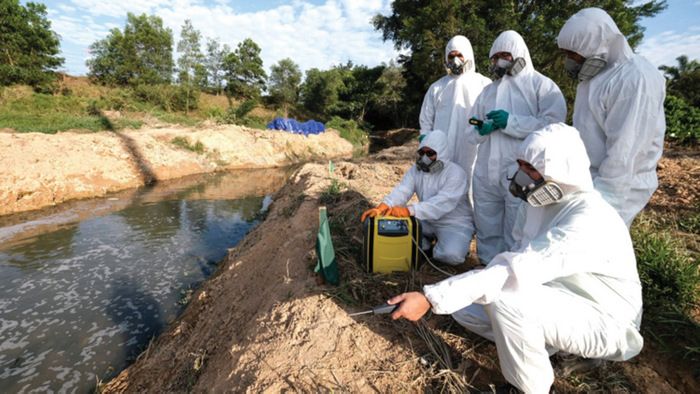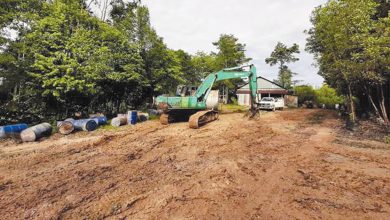Thinking Allowed: How Safe and Clean are Perak’s Rivers?


By Mariam Mokhtar
After the environmental disaster in Johor, when irresponsible people dumped at least one truckload of chemicals into Sungai Kim Kim, we should ask, “How safe are rivers in Perak?”
Thinking about our rivers alone is not enough. How safe is the air? What about contaminants on the land?
The devastation caused by the effluents dumped in Sungai Kim Kim was not noticed until children from schools along the river fell ill from the noxious fumes. The problem with many of us is that we strongly believe, that what we cannot see will not harm us. The ordinary person is probably not aware that many gases which can kill us are both odourless and colourless.
So, why do we wait until disaster strikes before we learn to take note of our surroundings, and start to care for the environment and other living things? Why wait till tragedy strikes? Why wait till hundreds of children, and the vulnerable like the elderly and babies, are struck down?
Have we considered the livestock, and the fish in the rivers, and seas? What about the milk from cows, or the meat from animals, which have consumed contaminated feed or water?
What about the plants that are grown in soil which has been contaminated by certain chemicals? Older readers may recall the Japanese, Mitsubishi Asian Rare Earths (ARE) plant near Lahat, which attracted controversy in the 1980s. There was no proper disposal of radioactive waste. The residue was allowed to be taken home by some workers, to be used as fertiliser for their cottage gardens. Children suffered birth defects and some had childhood leukaemia.
A few years ago, I went on a river tour in the Kuala Sepetang area and the villagers who transported me in their boat complained that a factory upriver, had discharged some chemicals into the water. They alleged that they had contacted officials in the Forestry Department who then alerted the relevant departments, so they could take action and punish the factory owners. They wanted to stop them from breaking the law and dumping effluent into the river.
The villagers then alleged that the company owners contacted their political friends, to stop the investigation.
This abuse of power, should not have happened, but is more common, than we think.
The villagers said that the foamy effluent had killed off the udang galah spawn, and as they could not supply the restaurants with freshwater prawn, their secondary source of income was drastically reduced.
The flora and fauna, in and along the riverbank, depend on river water which is in pristine condition. As the effluent had killed off certain species, some of the plant and insect life could not thrive. The ecosystem of the river was adversely affected.
Another problem which affected the insects was light pollution. Some parts of the river are illuminated by the powerful lamps at the interchange of one stretch of the North-South highway.
As the insects migrate to areas where there is less intrusion of these bright lights, the fireflies, which my group had gone to see, were less accessible. With a scarcity of insects, because of light pollution and river pollution, tourism, which is the other major source of income for the villagers, (besides the freshwater prawn), was severely affected.
Many people think that the prawn farms built in the estuaries are good for the economy. The farms like any other business, need proper control and enforcement. Malaysians may not realise, that when prawn farms expand their business, they destroy large areas of mangrove swamps. The shrimps are dosed with chemicals and antibiotics to keep them alive in their confined and artificial spaces. The discharge of effluents to treat these shrimps disturbs the ecosystem of the river, the mangrove forests, and threatens many other species.
The state administration must realise that when an issue is brought to their attention, they cannot view things in isolation. They must see things as a whole, and interact with other government agencies, to resolve the problem.
By and large, the preservation of the environment boils down to attitude. Our attitude must change, from the bottom up, and then top down. The irresponsible people who dumped the chemicals could not care less, that downriver, the effects would be devastating.
People chase money and want to do things on the cheap, because doing things the proper way, is costly.
A chemical treatment plant may be expensive, but it is cheaper in the long run. Just think of the extra expense, the bad publicity, and the time consumed by the authorities to clean up a river, and pay for medical treatment for the communities which have been affected, and pay compensation for any deaths or serious illnesses caused by the chemicals. This is in addition to finding the person, or people, responsible for polluting the air, water or soil, and punishing him and his company.
A chemical stack is expensive, but it is needed to treat noxious, gaseous chemicals before they are discharged into the atmosphere.
The BBC reported that Malaysia has become the dumping ground for plastic waste from the world. Our landfill sites are overflowing. Inconsiderate people burn imported waste and pollute our air, threatening the lives of the people and livestock. As is common in Malaysia, enforcement is poor and if you have a corrupt official, who will protect his crony friend, family or business partners, nothing will be done.
So, next time, you see a lorry discharging its load into a river, will you report it to the authorities or will you think, “I don’t want to get into trouble when they start asking questions.”
Or will you think, “I can’t report them because my wife works in that factory and she will be out of a job if they find out I had reported the pollution.”
Or will you say, “He is my business partner and if he is shut down, I will also lose my income.”
Or will you tell yourself, “I will report the perpetrator, and send pictures of the act to the authorities, because I want my children and grandchildren to inherit a safe, clean and unpolluted countryside.”


